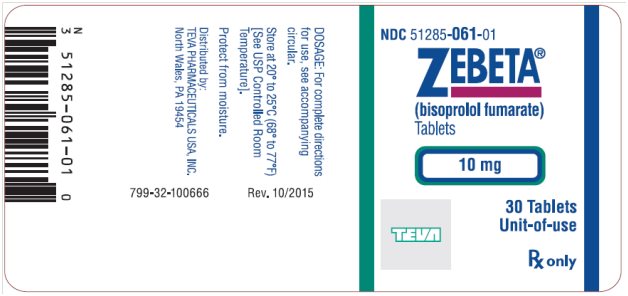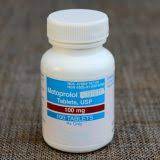Buy Zebeta Online from Our Canadian Pharmacy


Bisoprolol
What is Zebeta?
Zebeta is a cardioselective beta-blocker used to manage hypertension and chronic heart failure by reducing heart rate and blood pressure. Available in 5 mg & 10 mg tablets, it helps prevent complications like strokes and heart attacks. Common side effects include fatigue and dizziness. Take it at the same time daily, with or without food. Consult your doctor before use and for potential drug interactions.
Product Overview
Zebeta, a cardioselective beta-blocker, is utilized for the management of hypertension and chronic heart failure. By targeting and blocking beta-1 adrenergic receptors in the heart, Zebeta effectively reduces the heart rate and the force of heart contractions, decreasing oxygen demand and helping to lower blood pressure. This mechanism helps prevent complications like strokes and heart attacks, improve heart function, and reduce heart strain.
Frequent side effects are fatigue, dizziness, headaches, nausea, and a decreased heart rate.
Zebeta is available in 5 mg and 10 mg tablets, and the dosage is adjusted to meet the unique needs of each patient. For hypertension, the initial dose is typically 5 mg daily, adjustable up to 20 mg if necessary. For chronic heart failure, the initial dose starts at 1.25 mg, with gradual increases based on tolerance.
It’s important for patients to take Zebeta consistently at the same time each day, whether they eat or not, and to avoid stopping the medication abruptly without healthcare provider approval.
Store Zebeta in its original container at room temperature, away from moisture and heat. Zebeta may interact with various medications, including calcium channel blockers, antiarrhythmic drugs, and NSAIDs. Alternatives include Lopressor (metoprolol), Tenormin (atenolol), and Coreg (carvedilol). Always consult a healthcare expert for personalized medical advice before starting any new medication.
Uses of Zebeta
- High blood pressure
Benefits of Zebeta
- Lowers Blood Pressure
- Reduces Heart Strain
- Prevents Heart Complications
- Improves Heart Function
Side Effects of Zebeta
Common side effects of Zebeta may include:
- Fatigue
- Dizziness
- Headache
- Nausea
- Diarrhea
- Constipation
- Cold hands and feet
- Slow heartbeat (bradycardia)
- Depression
- Shortness of breath
[Note: This list is not exhaustive; if you notice any other symptoms not mentioned above, consult your doctor immediately.]
Zebeta Dosage
Forms & Strengths
Zebeta comes in the following forms and strengths:
- 5mg
- 10mg
Recommended Dosages
For Adults with Hypertension
- Initial Dose: 5 mg once daily.
- Maintenance Dose: Adjusted based on response, typically between 5 and 10 mg once daily.
- Maximum Dose: Up to 20 mg once daily for blood pressure control.
For Adults with Chronic Heart Failure
- Initial Dose: 1.25 mg once daily.
- Titration: Gradually increase the dose based on tolerance, typically doubling the dose every two weeks.
- Maintenance Dose: Usually between 5 mg to 10 mg once daily.
- Maximum Dose: 10 mg once daily.
For Elderly Patients
- Initial Dose: Due to the increased sensitivity and chances of side effects, a lower dose of 2.5 mg once daily may be used initially.
- Maintenance Dose: Adjust as needed, typically not exceeding 10 mg once daily.
For Patients with Hepatic or Renal Impairment:
- Initial Dose: Start with a lower dose of 2.5 mg once daily.
- Maintenance Dose: Adjust based on clinical response and tolerance.
How to Take Zebeta?
- Take Zebeta exactly as prescribed by your healthcare provider.
- Swallow the Zebeta tablet whole with a glass of water; do not crush or chew.
- Take the medication simultaneously daily to maintain an even level in your bloodstream.
- Zebeta can be taken with or without food.
- Regularly monitor your blood pressure and heart rate as advised by your doctor.
- Do not stop taking Zebeta without consulting your doctor, as this can cause serious heart complications, especially if you have heart disease.
Missed Dose
If you miss a dose of Zebeta, take it as soon as you remember. If it’s almost time for your next dose, skip the missed dose and continue your regular schedule. Do not double the dose.
[Note: Do not take two doses of Zebeta at the same time to compensate for a missed dose. This could heighten your risk of suffering from side effects.]
Overdose
If you think you might have overdosed on Zebeta, get medical help right away. Possible symptoms include extreme dizziness, fainting, breathing problems, or an abnormally slow or irregular heartbeat.
[Note: If you notice you have taken too much medication, call your local emergency number immediately.]
How Does Zebeta Work?
Zebeta works by blocking beta-1 adrenergic receptors in the heart, which reduces the heart rate and force of contraction. By decreasing the heart’s oxygen demand and lowering blood pressure, this action simplifies the process of blood pumping for the heart. Zebeta is commonly used to treat hypertension and helps prevent complications such as strokes and heart attacks.
Important Safety Precautions
- Ensure Zebeta is safe for you, especially if you have asthma, diabetes, thyroid disorders, or severe allergies.
- Regularly monitor your heart rate and blood pressure, as Zebeta can slow down the heart rate.
- If you are pregnant or breastfeeding, consult your doctor about using Zebeta, as it may not be advisable.
- Do not stop taking Zebeta suddenly without consulting your doctor; this may worsen heart conditions.
- Inform your doctor about all other medications you are taking, as Zebeta can interact with other drugs, including over-the-counter medicines and supplements.
- Be alert for signs of bradycardia (slow heart rate), dizziness, or fatigue, which could affect your ability to drive or operate machinery.
- Reduce alcohol intake since it can intensify Zebeta’s effect on lowering blood pressure and increasing dizziness.
Storage
- Store at room temperature, ideally between 20°C to 25°C.
- Keep the medication away from excessive moisture and heat. Do not store it in the bathroom.
- Keep Zebeta in its original container, tightly closed to protect it from light.
- Ensure that Zebeta is out of reach of children and pets.
- Confirm the expiration date on the package, and do not use the product beyond this date.
- Safely dispose of expired or unused medication by adhering to local regulations.
Zebeta Interactions
- Calcium Channel Blockers: Like verapamil & diltiazem, can enhance the effects of bisoprolol on heart rate and blood pressure.
- Antiarrhythmic Drugs: Including amiodarone and propafenone may increase the risk of slow heart rates.
- Antihypertensive Agents: Concomitant use with other blood pressure medications can produce an additive effect and further lower blood pressure.
- Nonsteroidal Anti-inflammatory Drugs (NSAIDs) May reduce the blood pressure-lowering effects of bisoprolol.
- Insulin and Oral Diabetes Medications: Bisoprolol can mask the signs of low blood sugar (hypoglycemia).
- Sympathomimetic Drugs: Like epinephrine, may reduce the effectiveness of bisoprolol or exacerbate conditions like angina or hypertension.
- Respiratory Drugs: Beta-2 agonists like albuterol, used for asthma, can counteract the effects of bisoprolol.
- Monoamine Oxidase Inhibitors (MAOIs): Can potentially enhance bisoprolol’s hypotensive (blood pressure lowering) effect.
- CYP2D6 Inhibitors: Like fluoxetine and paroxetine, they can increase the plasma levels of bisoprolol, possibly leading to enhanced effects and side effects.
- Digitalis: When used with bisoprolol, it increases the risk of bradycardia (slow heart rate).
[Note: This list of interactions isn’t complete. Talk to your doctor if you notice any interaction with food, over-the-counter drugs, prescriptions, or supplements.]
Zebeta Alternatives
- Lopressor, Toprol XL (metoprolol)
- Tenormin (atenolol)
- Inderal (propranolol)
- Coreg (carvedilol)
- Bystolic (nebivolol)
- Sectral (acebutolol)
- Betapace (sotalol)
[Note: Your healthcare provider will choose which Zebeta alternative is best for you. Taking or consuming them by yourself may cause serious side effects.]
Frequently Asked Questions
What kind of beta blocker is Zebeta?
Bisoprolol is a cardioselective beta blocker, meaning it primarily affects the heart. It is less likely to cause respiratory issues than non-selective beta-blockers, which can affect both the heart and lungs.
Is it okay to take Zebeta at night?
According to research, the timing for taking bisoprolol isn’t strictly fixed to a specific time of day. What’s crucial is maintaining consistent medication levels in your body by taking it at the same time every day. Choose a time that fits easily into your daily routine and consistently take your medication at that time.
Can Zebeta cause heart failure?
Beta-blockers like bisoprolol can potentially worsen heart failure in individuals whose symptoms are not well-controlled. In rare cases, people without heart failure might develop symptoms. If you have heart failure, your provider will manage your symptoms before starting bisoprolol to ensure it’s safe and beneficial for you.
Is it safe to abruptly discontinue bisoprolol?
You should not stop taking bisoprolol without consulting your healthcare provider first. Abruptly discontinuing this medication may cause severe health issues, such as abnormal heart rhythms and heart attacks. If there’s a need to stop the medication, your provider will guide you in gradually reducing your dose until it’s safe to discontinue use completely.
Our Guarantee
At Arctic Meds, we guarantee that you will find the most competitive prices for purchasing Zebeta through our platform. We are dedicated to offering only the top quality products as the premier Canadian online pharmacy. Each order is fulfilled through a reputable and licensed Canada pharmacy online, ensuring that every product we ship meets stringent standards of quality and authenticity. Our reliable service ships your medications directly from Canada right to your doorstep. For seamless access to buy Zebeta online from Canada at a low price contact us.


